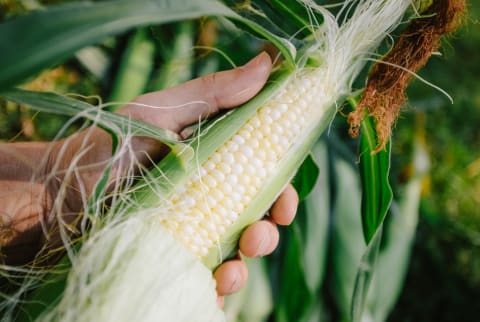Advertisement
Everything You Ever Wanted To Know About Making Perfect Corn


Nothing tastes like summer quite as much as the first bite of really good corn, but the seasonal staple can come with its own set of questions. How do you find high-quality corn? How do you cook it once you've found it? What are the best toppings? Here, we break down everything you need to know to get the best out of the BBQ staple.
How do you find good corn?
No, you don't need to de-husk corn to tell if it's good to eat. Start with the tassels: you want them to be silky and soft, not dried out or moldy in any way. The husk should feel slightly damp, and free from any holes, which indicate insects got in. Then feel the corn in the husk—the kernels should feel plump and firm. You can peel back the husk a tiny bit to make sure the kernels go all the way to the end, but don't go any further, as it ruins the experience for the next person who comes along. In more good news, while much of the corn in the U.S. is genetically modified, the type that we eat on the cob generally is not and actually tends to be fairly pesticide-free—while organic is always a great option, conventional corn is relatively innocuous.
How should you store your corn?
Corn can be stored at room temperature for a day or so and should be kept in the crisper section of your refrigerator if you'll use it any later. Always store corn with the husks on.
What's the best way to cook corn on the grill?
Ah, the perpetual debate—should you grill corn with the husks on or remove them? The answer, honestly, is that it's a personal preference.
You can strip the husks from corn and put it directly on the grill, which will result in a smokier, more charred flavor, with the corn itself taking on the black marks from the grill. If you cook the corn in the husk, it essentially steams, resulting in softer, sweeter corn, but none of the smokiness associated with BBQing (while some people recommend soaking corn in husks before cooking, most experts agree that it doesn't make the final outcome better in any noticeable way).
Want the best of all worlds? Pull back the husk, remove the silk, and then replace the husk so it loosely covers the corn. The smoke from the BBQ will still flavor the corn, but in a more subtle way than if you put it directly on the grates. As a bonus, you can add seasoning—butter, ghee, olive oil, or spices—to the corn before you replace the husk, infusing it with delicious flavors.
How long should you cook corn on the grill?
You'll want to cook your corn on medium heat on the grill. De-husked corn will take about 8 minutes, being rotated several times while cooking—you'll know it's done when it's evenly dotted with grill marks on all sides. Corn that's still in the husk will take longer, usually around 15 to 20 minutes. You'll want to rotate corn in the husk every 5 minutes or so to ensure even cooking.